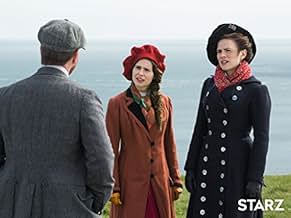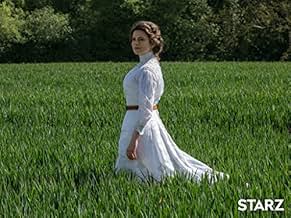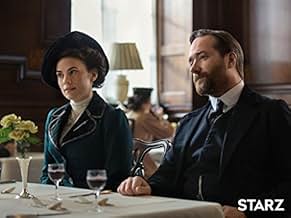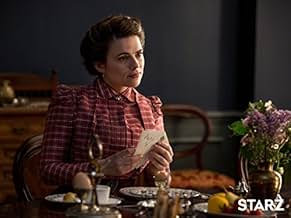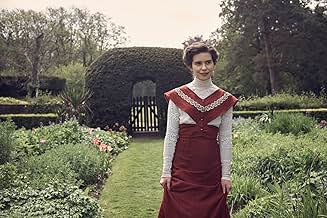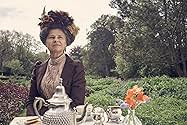The social and class divisions in early 20th century England through the intersection of three families - the wealthy Wilcoxes, the gentle and idealistic Schlegels and the lower-middle class... Read allThe social and class divisions in early 20th century England through the intersection of three families - the wealthy Wilcoxes, the gentle and idealistic Schlegels and the lower-middle class Basts.The social and class divisions in early 20th century England through the intersection of three families - the wealthy Wilcoxes, the gentle and idealistic Schlegels and the lower-middle class Basts.
- Nominated for 1 BAFTA Award
- 1 win & 12 nominations total
Browse episodes
Featured reviews
Although I felt the 1992 film was so good that it couldn't be improved on, I found this TV version surprisingly good and the four hours hardly seemed enough to contain all the strands of the story. The acting was perfect, neither overdone nor underdone. As it happens, I live in Stevenage and know the location of Howards End well. The location used was somewhere else of course but I thought it was quite like the original could have been in 1890 when the author would have known it, and perfect for the purposes of the drama. I sympathise with the points people make about black servants and so on, but whether or not these exist in the book, they are certainly quite plausible for the time. The winner for me was E.M. Forster again, as it was in 1992, but I will miss the programme and wish there could be a sequel - perhaps another Passage to India. It's indeed a pity that Forster stopped writing novels so soon, as with his understanding of social mores and change, he would have been a good person to write about the 1930s or 1940s. The last hour was for me a blissful one.
...is that they don't put their money where their mouth is and have a lead character played by a racial minority person. Inserting people of color in some of their recent productions is just too obviously done because they have to stick a minority in there somewhere or they will feel the trendy white guilt. It is an insult to anyone with a logical and realistic brain cell in their head why they do this. And although I am sure the minority actors are very happy to have the roles and the money and the exposure, you would think they would feel somewhat put out because they are being used to be tokens of political correctness not because of their talents.
Hayley Atwell enchants in this brilliant and faithful BBC adaptation of EM Forster's great novel. All of the actors are very convincing in their portrayal of multi-faceted characters. I didn't want the show to end. It's a thorough examination of class and social mores, and the message is not lost in time and very much relevant today in the debate between liberals and conservatives. The human spirit, compassion and love prevail. A must-watch for period drama fans like me.
This series is quite beautiful in terms of scenery, score and cinematography, and though the dialogue is a bit meandering and often feels to be of little consequence I did enjoy the dynamic between the three siblings and their aunt.
The main issue I have with the series is the total lack of chemistry between any of the romantic pairs. Absolutely none of their relationships felt believable.
The only characters I felt had any potentially sexual chemistry was Mrs Wilcox and Margaret, so to see Margaret later paired with the bland, unlovable and callous Mr Wilcox was baffling. The feelings which they supposedly have for each other do not read as authentic, and so Margaret becomes a less likeable character as a consequence.
Furthermore, several pieces of the story feels disjointed - I'm thinking particularly of the space between episodes 1 and 2 and the of end; both places where large amounts of time is skipped over. This kind of skipping is of course typical of epilogues, but in this case it felt weirdly jarring. They were obviously trying to wrap the series up in a neat little bow, but if felt anything but neat.
Without spoiling the end, the events which lead to the resolution seemed extremely cheap and almost offensive in how certain characters were disposed of.
If nothing else the series did make me curious to read the book Howard's End and see whether the series fails due to going too far away from the source material, or not having the proper means to give the source material life.
The main issue I have with the series is the total lack of chemistry between any of the romantic pairs. Absolutely none of their relationships felt believable.
The only characters I felt had any potentially sexual chemistry was Mrs Wilcox and Margaret, so to see Margaret later paired with the bland, unlovable and callous Mr Wilcox was baffling. The feelings which they supposedly have for each other do not read as authentic, and so Margaret becomes a less likeable character as a consequence.
Furthermore, several pieces of the story feels disjointed - I'm thinking particularly of the space between episodes 1 and 2 and the of end; both places where large amounts of time is skipped over. This kind of skipping is of course typical of epilogues, but in this case it felt weirdly jarring. They were obviously trying to wrap the series up in a neat little bow, but if felt anything but neat.
Without spoiling the end, the events which lead to the resolution seemed extremely cheap and almost offensive in how certain characters were disposed of.
If nothing else the series did make me curious to read the book Howard's End and see whether the series fails due to going too far away from the source material, or not having the proper means to give the source material life.
Love the book, and EM Forster's other work, and the 1992 film is not only one of the best Forster adaptations it is a wonderful film in its own right. BBC have done a lot of very good to outstanding period drama adaptations and the cast are a talented lot, so a large part of me was really looking forward to their adaptation of 'Howard's End'.
Watching all four episodes, found myself finding a lot to like about 'Howard's End' (2017) but feeling also it had its short-comings that stopped me from loving it. Of this and the 1992 film, as unfair it would seem to compare, there is no question which is the better one of the two, with the 2017 adaptation lacking the nuanced depth, emotion and elegance of the film.
There is a lot to like about 'Howard's End' (2017). It is impeccably made visually, with the period detail sumptuous and evocative, stylish costumes, beautiful photography and even more beautiful scenery/locations. The direction is admirably restrained without being pedestrian.
'Howard's End' (2017) is intelligent and controlled, doing a lovely job exploring Forster's many themes and insights that still hold relevance and provoke thought today (at least to me). Appreciated the subtle, restrained approach to the storytelling, and on the most part keeps the many layers and characterisation interesting.
Casting is also strong, with the standouts being Hayley Atwell, capturing Margaret's good intentions, spirit and emotional repression with ease, and a movingly poised Julia Ormond. Matthew MacFadyen brings a suitable amount of charisma. A lot of talk has been made about the diversity, this didn't bother me at all and am sure Forster himself wouldn't have been bothered by it, it didn't seem jarring and to me it seems to be something insignificant blown out of proportion.
On the other hand, as indicated, 'Howard's End' had its shortcomings. The first episode was something of a slow starter, it needed more zest and tighter pacing for an episode that felt more like set up than anything else. Stick with it though, because the other three episodes improve on this when the story and characters become richer and deeper. Timeline changes could have been clearer, sometimes it did feel jumpy and one doesn't know how much time has passed.
For me, and quite a few others it seemed, the music was a bit too intrusive and the sound could have been toned down. While the cast were on the most part very impressive, Tracy Ullman overdoes it a bit.
In summary, good but could have been more. 7/10 Bethany Cox
Watching all four episodes, found myself finding a lot to like about 'Howard's End' (2017) but feeling also it had its short-comings that stopped me from loving it. Of this and the 1992 film, as unfair it would seem to compare, there is no question which is the better one of the two, with the 2017 adaptation lacking the nuanced depth, emotion and elegance of the film.
There is a lot to like about 'Howard's End' (2017). It is impeccably made visually, with the period detail sumptuous and evocative, stylish costumes, beautiful photography and even more beautiful scenery/locations. The direction is admirably restrained without being pedestrian.
'Howard's End' (2017) is intelligent and controlled, doing a lovely job exploring Forster's many themes and insights that still hold relevance and provoke thought today (at least to me). Appreciated the subtle, restrained approach to the storytelling, and on the most part keeps the many layers and characterisation interesting.
Casting is also strong, with the standouts being Hayley Atwell, capturing Margaret's good intentions, spirit and emotional repression with ease, and a movingly poised Julia Ormond. Matthew MacFadyen brings a suitable amount of charisma. A lot of talk has been made about the diversity, this didn't bother me at all and am sure Forster himself wouldn't have been bothered by it, it didn't seem jarring and to me it seems to be something insignificant blown out of proportion.
On the other hand, as indicated, 'Howard's End' had its shortcomings. The first episode was something of a slow starter, it needed more zest and tighter pacing for an episode that felt more like set up than anything else. Stick with it though, because the other three episodes improve on this when the story and characters become richer and deeper. Timeline changes could have been clearer, sometimes it did feel jumpy and one doesn't know how much time has passed.
For me, and quite a few others it seemed, the music was a bit too intrusive and the sound could have been toned down. While the cast were on the most part very impressive, Tracy Ullman overdoes it a bit.
In summary, good but could have been more. 7/10 Bethany Cox
Did you know
- TriviaHayley Atwell and Matthew McFadyen worked to together in "The Pillars of the Earth" in 2010.
- ConnectionsReferenced in Honest Trailers: The Oscars (2017) (2017)
Details
- Release date
- Countries of origin
- Official site
- Languages
- Also known as
- 霍華德莊園
- Filming locations
- Myddleton Square, Clerkenwell, London, England, UK(Schlegels' house)
- Production companies
- See more company credits at IMDbPro
Contribute to this page
Suggest an edit or add missing content









